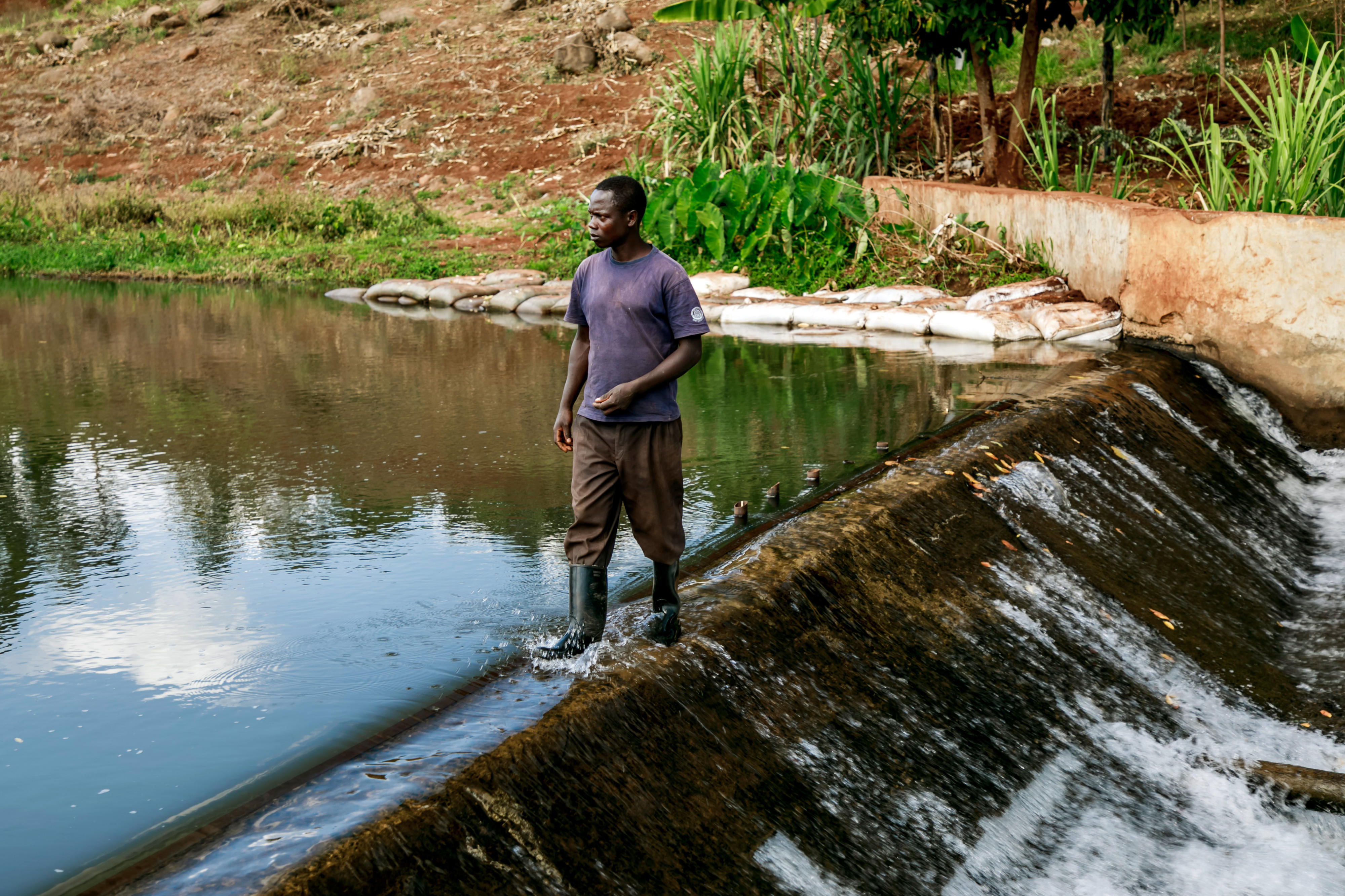Ein Mann auf einem Staudamm, von dem Wasser für die Bewässerung der Felder der Bauernkooperative Mitooni in Kenia abgeleitet wird.
Copyright© Michael Gottschalk/photothek.net
Integrated Water Resources Management (IWRM) Taking all stakeholders' interests into account
Worldwide, demand for water is growing. And in many regions, climate change adds to the risk that demand will significantly exceed availability. Inevitably, this leads to conflict between different water user groups, for instance between agriculture, industry and tourism, and between growing cities and the surrounding countryside.
IWRM makes it possible to apply the Sustainable Development Goals of the 2030 Agenda to the water sector. IWRM provides for the involvement of all user groups and the balancing of political and economic interests, basic social needs, and environmental requirements.
Cooperation is often a challenge in transboundary watersheds. However, taking a joint approach offers opportunities for cooperation and can contribute to regional stability and development (see also Transboundary water management).
The Federal Ministry for Economic Cooperation and Development (BMZ) supports sustainable, fair water resource management at a variety of levels:
Foster good governance
The sustainable and efficient management of water resources requires that the use of water and the handling of wastewater are governed by effective, transparent authorities that lay down clear rules, define tariffs, and monitor processes. As part of its development cooperation, Germany provides advice to ministries and local authorities with regard to developing an appropriate legal framework, establishing suitable administrative institutions, and providing opportunities for citizen participation, for instance through user communities. In all these efforts, the BMZ takes care to ensure that women and indigenous groups are able to enjoy appropriate participation in planning and management processes.
Improve available data
Reliable data is the basis for the sustainable and equitable use of resources. The BMZ supports activities to explore water resources, set up databases and well registers, and introduce digital technology in the water sector. This provides a basis for continuous monitoring of the water balance and water quality, early recognition of water management problems, and the prevention of illegal water withdrawal.
Manage supply and demand
Often, water scarcity is the result of inadequate and wasteful resource management. In many countries, more public awareness is needed of the fact that water is a precious and scarce good. The BMZ supports activities to reduce water consumption, enhance efficiency (for example in agriculture and energy) and manage consumption through appropriate, socially equitable water prices.
Improve availability of water
In water-scarce settings, the BMZ supports activities to increase the availability of water. This includes technical solutions like wastewater treatment, groundwater recharge through rainwater, and seawater desalination. But nature-based solutions play an important role, too, for instance wetland restoration and more efficient use of rainwater in agriculture.
Manage groundwater sustainably
Precipitation and seepage restore groundwater levels on a regular basis. Groundwater can be used for the provision of drinking water and for irrigation, for example. In order to ensure that groundwater is used sustainably, it is important not to extract more than can be recharged through precipitation and seepage. This requires suitable monitoring systems and effective resource management, including the regulation of water withdrawal and the designation of groundwater protection areas.
Fossil groundwater, which is buried deep underground, is not, or only on an extremely limited scale, recharged through precipitation and seepage. So it is not possible to manage this resource sustainably. It should be kept as a strategic reserve to supply drinking water in the event of an emergency or disaster. The BMZ therefore does not support any projects that use fossil groundwater for any other purposes, for instance agriculture.
Prevent pollution
Water resources are threatened by fertiliser and pesticides, industrial waste and also faecal contamination due to inadequate wastewater management. In order to protect bodies of water, the BMZ supports sustainable, circular wastewater management and the environmentally sound disposal of waste and wastewater, as well as responsible fertiliser and pesticide management.
Take water into account as a factor for economic development
Water is an important factor for economic development. According to estimates, over three quarters of the world's jobs depend on water. The BMZ therefore seeks to ensure that attention is given to the interactions between different sectors of the economy and areas of life (see also Water, energy and food security – the nexus perspective) and that water aspects play a stronger role – both nationally and internationally – in economic, industrial and financial policies.
Educate people about water consumption
In industrialised countries, people consume many products from developing countries whose production causes water overexploitation or pollution. What is called the “water footprint” describes the amount of water that has been used directly or indirectly in the making of a given product. This takes account of the entire amount used or polluted in the regions where the product is made, and also of water that evaporates in the course of the production process.
The BMZ is working together with industry, for instance in the textile sector, to make production resource friendly. Germany's due diligence act requires companies to minimise human rights risks and environmental risks along their supply chains. In relation to water, this means preventing water pollution and excessive water consumption. The BMZ also engages in development education work within Germany to educate the public about options for sustainable consumption.
As at: 13/06/2024
